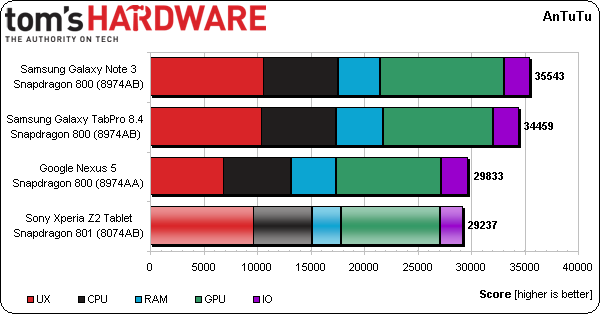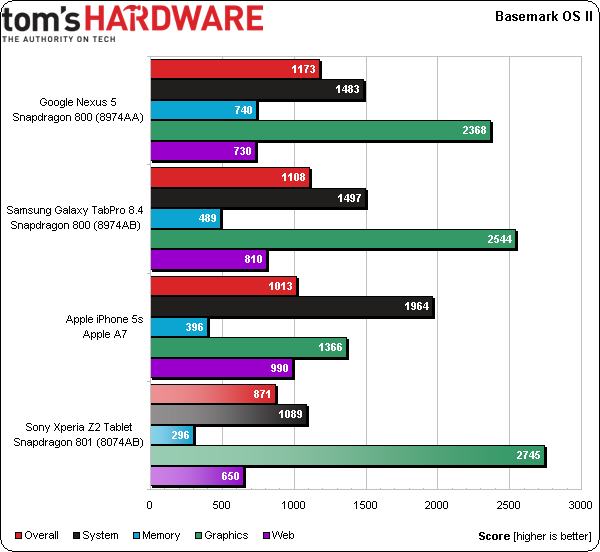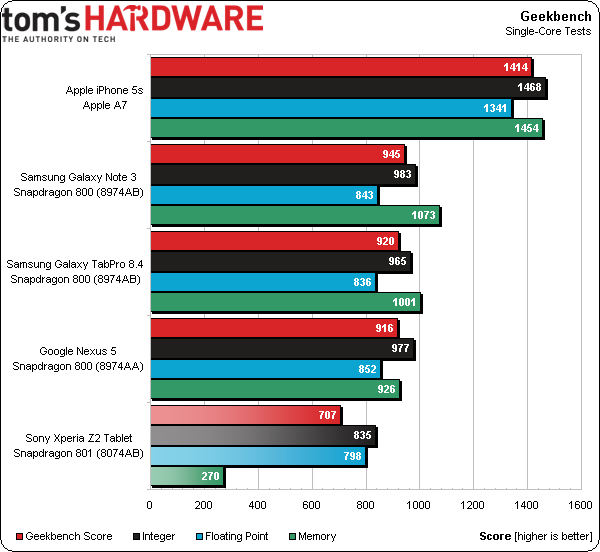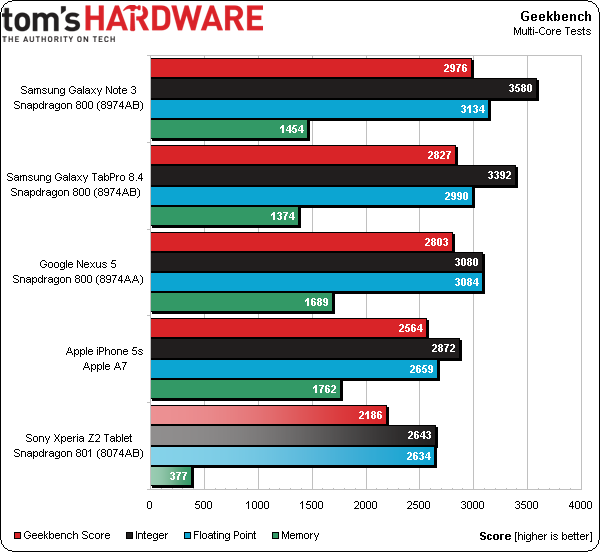Qualcomm Snapdragon 801: Performance Previewed
Snapdragon 801, the recently-announced update to the Snapdragon 800, shares some of the same SKUs as Snapdragon 800. So, how do you tell the difference? We break down the family and introduce you to the first benchmarks of Sony's Xperia Z2 tablet, too.
AnTuTu 4, Basemark OS II, And Geekbench 3
AnTuTu 4
AnTuTu is an Android system benchmark designed to test the performance capabilities of four major aspects of mobile devices: Graphics (encompassing 2D, UI and basic 3D), CPU (fixed, floating-point, and threading), RAM (read and write), and I/O (read and write).
It’s disappointing to see the Z2’s Snapdragon 801 right at the bottom of the pile. However, as a pre-production model, this Z2 could have some performance issues that are yet to be ironed out. After all, the RAM score is clearly lower than what the Nexus 5 achieves, and on paper, the Xperia Z2 should benefit from quicker memory.
Basemark OS II
Rightware is an experienced multi-platform benchmark developer. The company leverages this experience with Basemark OS II, an all-in-one tool designed for measuring overall performance of mobile devices. The test is available on all major smartphone platforms, including Android, iOS, and Windows Phone 8. Basemark OS II uses a similar approach to Geekbench, but focuses on more application-specific areas, particularly User eXperience (UX), Web browsing, and rendering performance.
Even though it remains quite clear that this particular Sony Xperia Z2 Tablet has a memory performance issue potentially affecting other sub-tests, this metric appears to better-exploit the Snapdragon 801’s improved GPU core speed. In that one metric, it easily bests the older Snapdragon 800 in Google's Nexus 5 and Samsung's Galaxy Tab Pro 8.4.
Geekbench 3
Primate Labs’ Geekbench is somewhat of an industry standard due to its long-standing database and wide cross-platform compatibility (Windows/OS X/Linux/iOS/Android). This benchmark produces two sets of scores: single- and multi-threaded. For each, it runs a series of tests in three categories: Integer, Floating Point and Memory. The individual results are used to calculate category scores, which in turn generate overall Geekbench scores.
The Xperia Z2 is in last place, and we see that memory performance is what's holding it back...again. In fact, the Z2’s single-core RAM performance is about 29% of the Nexus 5's. At least for now, we have to hope that this pre-production unit is deliberately hobbled, and that retail samples will better-represent the Snapdragon 801's potential.
It's doubtful that more threads vying for limited throughput will fare better than a single active core, but let's run the numbers anyway.
Get Tom's Hardware's best news and in-depth reviews, straight to your inbox.
As we guessed, the situation doesn't improve; low memory bandwidth pulls down platform performance dramatically. Based on its specifications, the Snapdragon 801 should at least put Sony's Xperia Z2 up with the Nexus 5, if not Samsung's Galaxy Pro 8.4.
Current page: AnTuTu 4, Basemark OS II, And Geekbench 3
Prev Page Snapdragon Showdown: 800 Versus 801 Next Page 3DMark And Basemark X 1.1-
Wisecracker A Temash APU and Atom SoCs would make a great cross-platform comparison, here.Reply
The 'Droid Heads would love to see some Tegra 3/4 action, too. -
MANOFKRYPTONAK I really am looking forward to the showdown between the A7/A8, Tegra4/K1. and Intel "what is the name of the chip in the nexus 8?". I hoping to see a worthy $500 upgrade.Reply -
anthony8989 Great article - very informative. Sorry if it's off-topic, but the HTC One (M7 2013) uses an APQ8064T. Did Qualcomm change the meaning of the second numeral from Snapdragon 600 to 80x? The HTC One M7 employs a modem yet now the second numeral being 0 indicates no modem. Or does the device substitute another modem off the SoC? Also what does the "T" suffix mean? :)Reply
EDIT: I realized APQ also indicates no modem so I'll just assume that they supplied an off-SoC modem for the device. Still would like to know what "T"stands for. -
rohitbaran Isn't Tegra K1 (aka Logan) having something else? Project Denver CPU was supposed to be part of Parker SoC as per nVidia's 2013 Tegra roadmap, unless I am missing something.Reply -
edlivian So if you already have a device with a snapdragon 800 you should hold off for a real improvement, like snapdragon 1000 or 1k or whatever marketing jibberish they want to name it.Reply -
edlivian So if you already have a device with a snapdragon 800 you should hold off for a real improvement, like snapdragon 1000 or 1k or whatever marketing jibberish they want to name it.Reply -
Vistouf From Wikipedia :"SKU refers to a stock-keeping unit, a unique identifier for each distinct product and service that can be purchased in business."Reply -
PapaCrazy They compared two different manufacturers devices from two generations in order to extrapolate something about the chip? Huh? What about differences in hardware implementation, software, memory, and all the other things that can independently effect performance? Would have been much better to wait and have more comparable devices to test.Reply



